In this [hypothetical] universe, kids have been playing games for centuries—and then these page-bound texts come along and suddenly they’re all the rage. What would the teachers, and the parents, and the cultural authorities have to say about this frenzy of reading? I suspect it would sound something like this:(Everything Bad is Good for You: How Today's Pop-culture is Actually Making Us SmarterReading books chronically understimulates the senses. Unlike the longstanding tradition of gameplaying—which engages the child in a vivid, three-dimensional world filled with moving images and musical soundscapes, navigated and controlled with complex muscular movements—books are simply a barren string of words on the page. Only a small portion of the brain devoted to processing written language is activated during reading, while games engage the full range of the sensory and motor cortices.It should probably go without saying, but it probably goes better with saying, that I don’t agree with this argument.
Books are also tragically isolating. While games have for many years engaged the young in complex social relationships with their peers, building and exploring worlds together, books force the child to sequester him or herself in a quiet space, shut off from interaction with other children. These new “libraries” that have arisen in recent years to facilitate reading activities are a frightening sight: dozens of young children, normally so vivacious and socially interactive, sitting alone in cubicles, reading silently, oblivious to their peers.
Many children enjoy reading books, of course, and no doubt some of the flights of fancy conveyed by reading have their escapist merits. But for a sizable percentage of the population, books are downright discriminatory. The reading craze of recent years cruelly taunts the 10 million Americans who suffer from dyslexia—a condition that didn’t even exist as a condition until printed text came along to stigmatize its sufferers.
But perhaps the most dangerous property of these books is the fact that they follow a fixed linear path. You can’t control their narratives in any fashion—you simply sit back and have the story dictated to you. For those of us raised on interactive narratives, this property may seem astonishing. Why would anyone want to embark on an adventure utterly choreographed by another person? But today’s generation embarks on such adventures millions of times a day. This risks instilling a general passivity in our children, making them feel as though they’re powerless to change their circumstances. Reading is not an active, participatory process; it’s a submissive one. The book readers of the younger generation are learning to “follow the plot” instead of learning to lead.
by Steven Johnson :19-20)
He makes some interesting points, yet I do not know just how useful the form of intelligence that you get from games is. Like the virtual world of books, I suppose it depends on what the game is and what its quality is. Many games probably are not the complete and total waste of time that the old timers think that they are, although ironically the same people seem to think that computers are like magic. Information technologies are usually merely knowledge in a different medium, although it does get to the point where no single person really knows how to put it all together, thus the impression of magic or something for nothing.
Well, I just played a few games with my brothers. Maybe we're the smarter for it. If we ever have to manage resources, armies and economies to conquer the world then I guess we'll be ready.
A few screenshots from our last game of Age of Mythology tonight:

My little brother, getting beat:

Me, not getting beat:
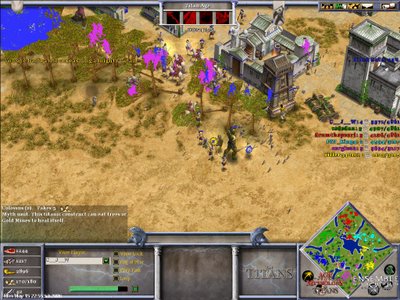
My titan, muwhahaha!(<---Sheesh, what's the right way to write an evil laugh, anyway?):
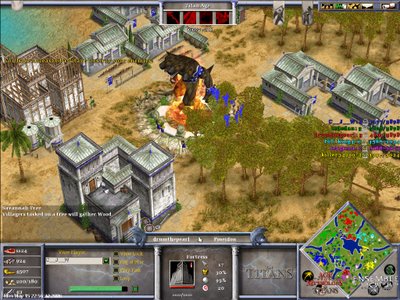
Game over,
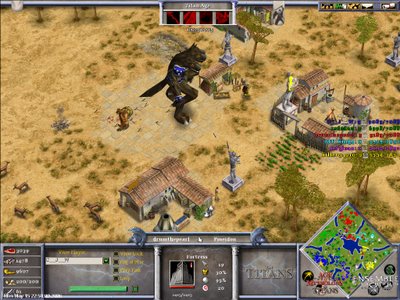
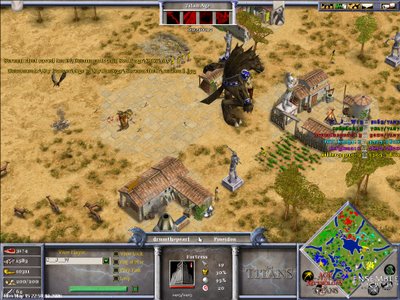
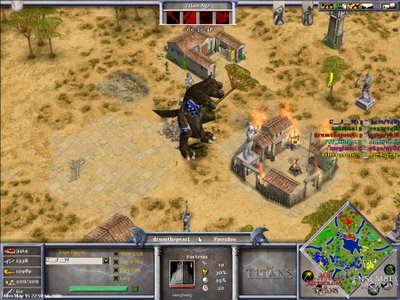
No comments:
Post a Comment